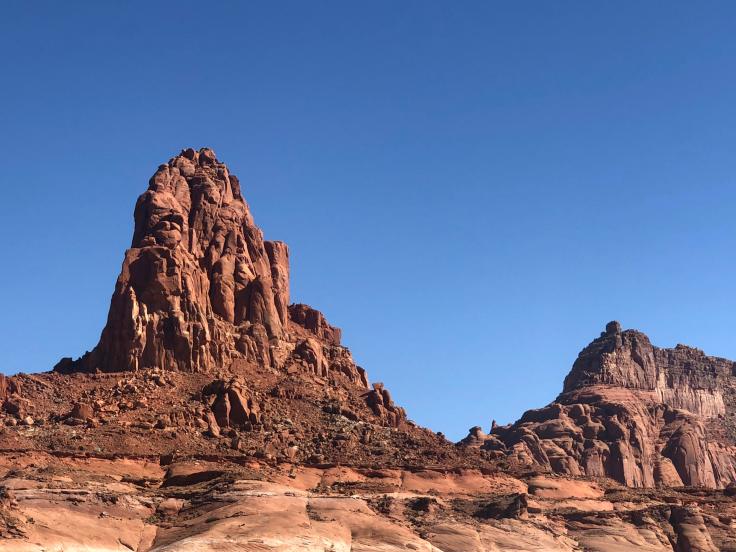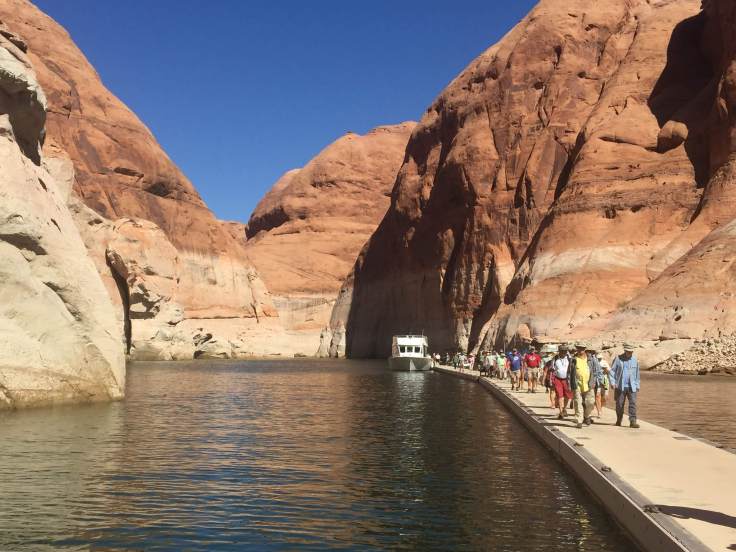
Today we took a boat ride around Lake Powell… We chose to sit on the upper deck in the sun all day…

Lake Powell is a reservoir on the Colorado River, straddling the border between Utah and Arizona. Most of Lake Powell, along with Rainbow Bridge National Monument, which we will be seeing today, is located in Utah. It is a major vacation spot that around two million people visit every year. It is the second largest man-made reservoir by maximum water capacity in the United States, behind Lake Mead, storing 24,322,000 acre feet of water when full. However, due to high water withdrawals for human and agricultural consumption, and because of subsequent droughts in the area, Lake Powell is currently larger than Lake Mead in terms of volume of water currently held. The lake was filled to capacity in the early 1980s and has never been completely full since then. Today it is about 150′ below maximum capacity, and about 50′ below average levels…
Lake Powell was created by the flooding of Glen Canyon by the Glen Canyon Dam, which also led to the creation of Glen Canyon National Recreation Area. The reservoir is named for explorer John Wesley Powell, a one-armed American Civil War veteran who, as you already know, explored the river via three wooden boats in 1869.
Lake Powell is over 186 miles long, and averages about 25 miles wide. There are over 90 side canyons, making the shoreline longer than the entire west coast of the USA. We will travel up the lake over 50 miles today, then we will go into one of the side canyons, dock, and walk/hike about one mile to see the Rainbow Bridge National Monument…
As I mentioned above, the lake is below its historic levels, as evidenced bu the white cliffs seen here. This “bathtub ring” shows where the water level was in the early 1980s…


Along the way we passed by several marinas, all packed with several millions of dollars of idle boats…

Our destination is Rainbow Arch, a natural bridge (an arch formed by water flowing under it…). This particular bridge is quite sacred to the Navajo people, and its preservation was a major concern during the construction of the Glen Canyon Dam and the resulting Lake Powell. Even at “full pond”, as they call it, the Rainbow Bridge will remain untouched…
But Rainbow Bridge isn’t the only geologic wonder… We passed by what appear to be frozen, or “petrified” sand dunes. These are solid rock…


We passed by many buttes…


While it was quite warm on the boat’s upper deck, the sky and water and rocks were beautiful…




After traveling about 50 miles we turned into this small side canyon. There are hundreds of these small side canyons along the lake’s 186 mile length, which makes it an ideal place for boating…


The further we went up the canyon the narrower it became…



While I’m sure our pilot knew where she was going, it was nice to see a sign that reassured us that we were in the right place…


Narrower and narrower…

Finally we spotted the dock…

We docked, and set out on the 1 mile hike to the Rainbow Bridge…

Finally it appeared…


But we walked on, and even went behind it to see it from behind…






Whether this was worth spending over five hours on the boat was a topic of discussion amongst the various caravaners…
We returned to the campground along the same route, so if you want to see what we saw, review the pictures above, backwards…
We had a lovely dinner at “Bonkers”, an unfortunately named restaurant in Page, with another caravan couple, then we returned to the campground for another Drivers Meeting…

Apparently, our granddaughter, Evelyn, enjoyed her dinner today, as well…

And an enjoyable time was had by all…
Leave a comment